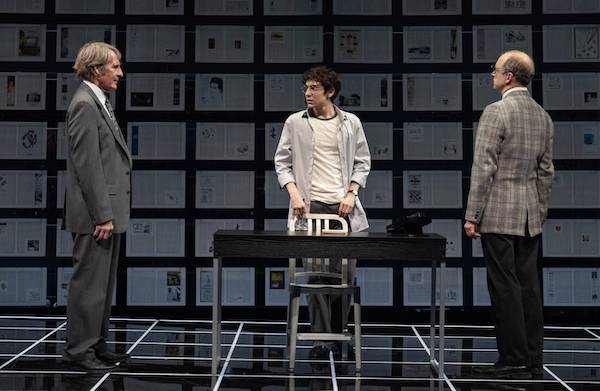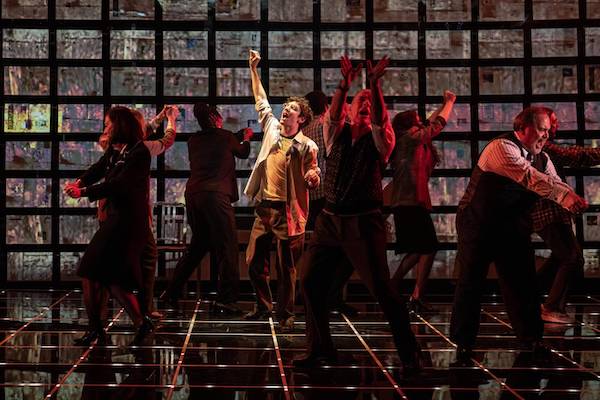NY Theater Review: “The Connector” – Truth or Consequences
By Melissa Rodman
The musical’s focus on truth in journalism resonates in our post-2016 “fake news” and Artificial Intelligence–saturated environment.
The Connector, book by Jonathan Marc Sherman, music & lyrics by Jason Robert Brown, conceived & directed by Daisy Prince, choreographed by Karla Puno Garcia. Staged at The Newman Mills Theater, in The Robert W. Wilson MCC Theater Space, New York City, through March 17.

A scene from The Connector. Photo: Joan Marcus
A young man walks into the offices of a renowned magazine. He has long admired its journalism and desperately wants to write for it. The young man scores a meeting with its storied editor, who reviews one of his college newspaper clips and, impressed, decides to revise and republish it in the magazine. Thus begins the hotshot’s ascent. But, as the proverb goes, pride comes before a fall. This story plays out in The Connector, both the title of a new musical and the fictional magazine at the heart of the show.
Protagonist Ethan Dobson, a Princeton grad with unchecked ambition and an ego to match, resembles Stephen Glass or Jayson Blair, up-and-coming journalists in the 1990s and early 2000s proven to have fabricated their reporting in the New Republic and New York Times, respectively. Played by Ben Levi Ross, appropriately affected and fidgety, Ethan arrives at The Connector in December 1995, on the eve of the magazine’s 50th anniversary. The show’s opening number runs through a brief history of The Connector, highlighting its founder’s goal to create “a magazine that spoke for his generation,” young adults living in the wake of World War II. The ensemble, dressed in gray suits and pencil skirts, pace across the stage, creating the ambiance of an active newsroom. The slick, minimalist set (designed by Beowulf Borrit) features a backdrop of hanging magazine spreads and just a few desks, which move in and out of the show’s scenes.
It is the late ’90s and The Connector is adapting to the realities of new corporate ownership, the pressures ranging from petty debates over whether the office walls should be painted saffron or turquoise to escalating demands that content boost circulation numbers. Ethan meets editor Conrad O’Brien (played by Scott Bakula), who himself was guided through The Connector’s ranks by its founder, after one such corporate meeting. Brownnoser that he is, Ethan is prepared to ace the interview. He can name The Connector’s staff, recap their recent stories, and, making the case for Conrad to give him a chance, cites a previous student journalist whose work was published in The Connector. “Flattery will get you everywhere with some people,” Conrad says, already charmed by Ethan and his writing sample and settling into a myopic mentorship. “The question I have to answer is, do I think you’re a one-trick pony or a legacy writer?”
As Ethan schmoozes around the newsroom, easily befriending the magazine’s staff as he notches bylines via his profiles of eccentric individuals, copyeditor Robin Martinez (played by Hannah Cruz) — whose writing hasn’t been published in The Connector, despite her submitting drafts to Conrad — sees through Ethan’s act. Still, the two share similar literary dreams and develop a relationship, which feels only vaguely romantic in Levi Ross’s and Cruz’s portrayals (likely because Ethan’s one-track mind is occupied by his quest for journalistic acclaim). They trade hometown stories, bonding through what galvanized them to move to New York. “Everyone’s an asshole in Texas,” Robin sings. “No one’s gonna speak the truth in a lying town, in a crooked place.” Ethan echoes her, “Everyone’s a scumbag in New Jersey.” Both yearn for more. The song swells beautifully — Cruz’s performance in particular — but you can just imagine the jabs that some might throw here about the liberal elite media’s privilege and exclusivity, not to mention about the death of local news.

A scene from The Connector. Photo: Joan Marcus
This question of “speak[ing] the truth” — or, rather, writing the truth — carries the show. The cracks start small. First, in a letter to the editor, the cardiganed and bespectacled Mona Bland (played by Mylinda Hull) chides a Connector article that described seesaws in the park as navy blue, even though they are “unquestionably cerulean.” Soon after this letter, Muriel, The Connector’s legendary fact-checker and a stickler for evidence (played by Jessica Molarskey), questions a reporter’s choice to set his story in a man’s front yard versus the front yard of the man’s building complex. Which is more accurate? Or, in other words, which version is the truth?
The thorny issues grow. When Ethan produces a story on the Jersey City mayor’s illicit activities but doesn’t have the tape to back it up, he defends the piece as “a character study.” Conrad supports Ethan, despite Muriel’s protests for proof. “This is a legitimate political scoop,” Conrad says, brushing over legitimate questions about Ethan’s reporting process. “Muriel, let it go,” Conrad adds. A little later, the mayor’s spokeswoman flags how Ethan did not quote “a single verifiable source.” We watch how information can be warped; an initial fact is pushed into something close but imprecise and then turns into a fictionalized version of events. In one memorable sequence, Ethan demonstrates this fluidity simply by modifying a hypothetical sentence. “A man walks down a street,” he sings, as a dream-like Conrad pantomimes the walk behind him. Then, Ethan adds several adjectives and changes the verb. “A pale, old man in a dusty suit hurried down a busy street,” he sings. Ethan (and Glass and Blair) should have written novels, not the news.
Meanwhile, Robin, overlooked both at The Connector and within the predominantly white, male industry in general, finds a reporting job at The New York Press. Her new boss, Nestor Fineman (Eliseo Román), compliments her work until he asks, starstruck, “Are you Ethan Dobson’s girlfriend?” Sigh. This subplot comes off somewhat dated for a post #MeToo audience, cementing The Connector as more a period piece than a commentary on today’s state of affairs in journalism. In the end, Robin’s reporting not only takes Ethan down, but lands her a byline in the last issue of The Connector.
Jason Robert Brown’s propulsive, percussion-rich score is omnipresent, at times even playing beneath the dialogue, to the point the production feels almost sung-through. Brown has said his musical influences for the show include late ’80s/’90s progressive rock, acid jazz, and Tropicália. A few melodic snippets stay with you (“And you can see yourself a fragment of, a fragment of, and you can see yourself reflected,” Conrad sings memorably, bolstered by the ensemble, toward the beginning of the show as he ruminates on journalism’s allure). But you won’t leave the theater singing the songs in their entirety.
The musical’s focus on truth in journalism, of course, persists in our post-2016 “fake news” and Artificial Intelligence–saturated environment. In a New Yorker essay published just last weekend, for instance, Clare Malone notes that “polls show that about two-thirds of the country now has little to no trust in the media.” People’s interest, eyeballs, and spending are going elsewhere — streaming, social media, ChatGPT — as evidenced by massive layoffs (Paramount’s recent job cuts include layoffs in its CBS news division) and the shuttering of publications. Meanwhile, with journalism’s reputation under duress, professors of the craft are staying vigilant: Glass and Blair remain cautionary tales on j-school syllabuses today.
Melissa Rodman is a journalist and critic based in New York.
